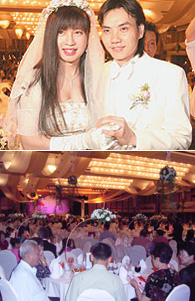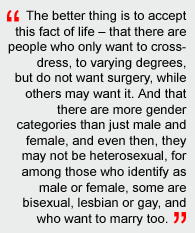On November 12, 2005, from out of nowhere, a wedding made the headlines. Jessie Chung married Joshua Beh in Kuching, Malaysia.

Some 850 family members and friends attended Jessie Chung and Joshua Beh's wedding banquet, a reception that reportedly cost more than RM200,000 (US$5,500).
This testifies to the incredible level of acceptance and support by the couple's families and friends, a fact so heart-warming that, alone, it brings tears to your eyes.
Moreover, three pastors from Bountiful Harvest, Shepherd's Centre and Assembly of Love, all said to be charismatic churches, blessed the couple at the ceremony.
The problem with press coverage is that reporters have a tendency to run to authority figures for comment. Authority figures being what they are, they don't only comment, they pass judgment.
Deputy Home Affairs Minister said the marriage is "invalid" under Malaysian law. "If they apply (for a marriage certificate), we definitely will ask for their identity cards. I guess they must have realised this and I think that is why they did not apply for it," he added.
The secretary-general of the National Evangelical Christian Fellowship, Rev Dr Wong Kim Kong, likewise disapproved, saying, "It's clearly stated in the Bible. There is no such thing as creation of half-half. Therefore, biologically and genetically, there is only male and female," he told Bernama News Agency.
"Therefore, there is no chance it (the marriage) will be condoned by the Christian church. As a religious group, we have to follow the religion based on the Bible."
As to what he thought of the three pastors who blessed the couple, the reports were silent.
Echoing Dr Wong, Dr Herman Sastri, the secretary-general of the Council of Churches of Malaysia (CCM) declared that CCM did not encourage the practice of sex change and same-sex marriages.
Instead, they would "help the person by understanding his predicament through counselling, seeking the views of the parents and doctors on why the sex change was carried out," he said in a statement.
He added that the CCM would help the person find happiness through faith in God and acceptance in the Church.
That's a rather wishy-washy statement, but at the end of the day, it sounds like this: come let us brainwash you into accepting your fate in life, sick, guilty and dirty though you may be.
From a longer perspective, all these responses are ahistorical. Asian cultures, from India to Java to Japan, have always had a place for the "third gender," sometimes more than three. Bugis society in Sulawesi recognises five genders.
Particularly in Southeast Asia, indigenous societies here recognise the feminised gender of the male sex as an integral part of the social spectrum; there's a rich vocabulary for them and there are social roles associated with them.
Traditional Chinese society has long had a place for male-acting females and female-acting males. Cross-dressing opera stars have from time to time been celebrities.
One might argue that in none of these societies was the third sex given equal pride of place with the first two, but that would be to read our contemporary concerns into the past, for historically, social equality was never considered a right, nor even a practical response to reality. Historically, societies were highly stratified and just because you were male still meant nothing. Siam had the institution of slavery until King Chulalongkorn abolished it; China and India had a tradition of indentured servants until living memory.

Another ahistorical feature of the responses to Ms Jessie Chung's marriage was the role of the State. For centuries, a couple was considered married if their families accepted they were so. It had nothing to do with religious leaders, even less with agents of the State. If your parents blessed your marriage, you were married.
Of course, it led to terrible abuses, in the form of fathers selling their daughters into marriage, but this neglect itself reinforces the point that the State didn't consider marriage customs to be any of its business.
Mr Beh and Ms Chung's marriage certainly met the traditional definition. Not only were their immediate families there, huge circles of friends too were there to witness and applaud.
It seems almost criminal that in the midst of so much happiness, the government and other church leaders can only be so sour.
"My marriage was supposed to be a happy occasion, " said Ms Chung to reporters a few days after the wedding. "It was, and I am thankful for it, but some post-marriage comments about us in the press were hurtful."
Malaysian law is silent on the permissibility of sex-change operations, but few have been performed in the country. Most who want such an operation go to Thailand or Singapore.
While the law is silent, Islam is not. The Conference of Rulers - comprising the sultans of the various states, each being the head of the Islamic religion in his own state - issued a ruling in 1983 forbidding sex change among Muslims.
Thus, for reasons for religion, most transgender Muslims in Malaysia decide against the operation.
Given the ruling, it must be extremely difficult for the government to amend the law to regularise the situation of post-operative transgenders. There is no provision for changing the notation of sex in a person's identity card; it strictly follows the birth certificate. And since legal marriage is only permitted for persons of opposite sex, without being able to change the sex in the identity card, it is impossible for post-operative transgenders to marry.
Moreover, Malaysian law does not even permit someone to fully change one's name. It permits the addition of a new name, but the old name is retained as an alias, so even in daily things like opening a bank account, or registering a mobile phone, transgenders are made to suffer unremitting humiliation, when the new name is of one sex contradicting the old name of a different sex.
Societies have to make up their minds about the issue. If they want to insist that the world is only male and female, and nothing else, then they must allow people who are in-between to regularise their status surgically and documentationally. They must allow people to erase their past in order to fit in.
Of all places in Asia, Singapore has followed this logic. Singapore permits sex change operations, permits the necessary amendments to the identity card and passport, and even permits post-operative persons to marry based on their new sex.
And yet the policy resolves little, because the problem with such thinking lies in the word "insist." People are individuals; they come in countless shades. The world is not only male and female, it is not only heterosexual, and no amount of insisting will make it so.
The better thing is to accept this fact of life - that there are people who only want to cross-dress, to varying degrees, but do not want surgery, while others may want it. And that there are more gender categories than just male and female, and even then, they may not be heterosexual, for among those who identify as male or female, some are bisexual, lesbian or gay, and who want to marry too.











 Printable Version
Printable Version











Reader's Comments
Be the first to leave a comment on this page!
Please log in to use this feature.